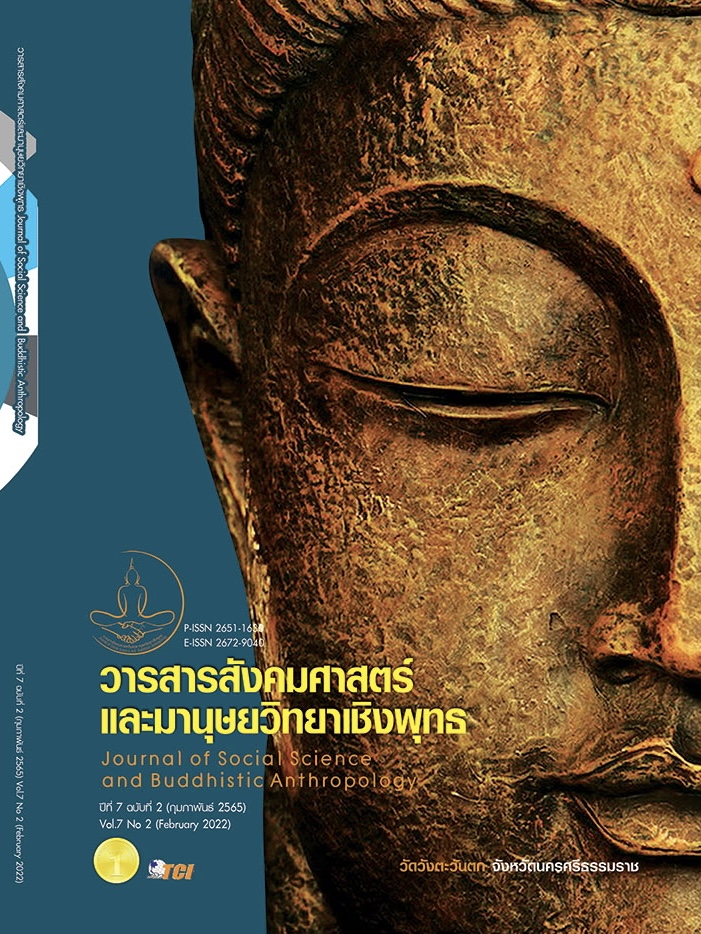DEVELOPMENT AND REPORT OF IMPROVING SCHOOL ADMINISTRATORS IN THE DIGITAL AGE OF SECONDARY SCHOOLSDEVELOPMENT AND REPORT OF IMPROVING SCHOOL ADMINISTRATORS IN THE DIGITAL AGE OF SECONDARY SCHOOLS
Keywords:
Development Program, Improvement, Educational Administrators, Digital AgeAbstract
The objectives of the research article were to: 1) developing a program to improve school administrators in the digital age of secondary schools, and 2) evaluate by using of educational program administrators in the digital age of secondary schools. This was development research by conducting research such as 1) study the conceptual framework of research by document analysis 2) study condition and need to strengthen. Using questionnaire improvement program by selected a specific sample as administrators of the school, consisting of 125 persons, and 3) study model and development of educational programs for administrators in the digital era by using a semi-structured interview and public hearing seminar that select a specific example of educational institution administrator, and academician including 20 persons. This was using average statistics standard deviation and paired t-test by analyzing the content and summarizing as a whole. It was found that 1) The development of educational programs for administrators. These are Phase 1 online training, Phase 2 hands-on training and PLC processes, and Phase 3, follow-up and evaluation. The contains 6 modules of program development activities that include with 1.1) creativity such as Initiative, agile, flexible, and thorough, 1.2) self-directed learning like analyzing one's own needs, set learning objectives, plan learning and seek scientific resources, 1.3) teamwork including communication, ability, and learning exchange activities, 1.4) integration of ideas such as learning processes, and connect relationships and new knowledge, 1.5) technology of digital era, including talent development budget and resource support, information technology and ethical communication, and 1.6) learning networks, including collaborative learning with stakeholders, building a learning network and reflection on learning outcomes together. And 2) The evaluation of educational program administrators that suitability and feasibility the mean of >3.51 and above is very appropriate pass the assessment criteria.
The objectives of the research article were to: 1) developing a program to improve school administrators in the digital age of secondary schools, and 2) evaluate by using of educational program administrators in the digital age of secondary schools. This was development research by conducting research such as 1) study the conceptual framework of research by document analysis 2) study condition and need to strengthen. Using questionnaire improvement program by selected a specific sample as administrators of the school, consisting of 125 persons, and 3) study model and development of educational programs for administrators in the digital era by using a semi-structured interview and public hearing seminar that select a specific example of educational institution administrator, and academician including 20 persons. This was using average statistics standard deviation and paired t-test by analyzing the content and summarizing as a whole. It was found that 1) The development of educational programs for administrators. These are Phase 1 online training, Phase 2 hands-on training and PLC processes, and Phase 3, follow-up and evaluation. The contains 6 modules of program development activities that include with 1.1) creativity such as Initiative, agile, flexible, and thorough, 1.2) self-directed learning like analyzing one's own needs, set learning objectives, plan learning and seek scientific resources, 1.3) teamwork including communication, ability, and learning exchange activities, 1.4) integration of ideas such as learning processes, and connect relationships and new knowledge, 1.5) technology of digital era, including talent development budget and resource support, information technology and ethical communication, and 1.6) learning networks, including collaborative learning with stakeholders, building a learning network and reflection on learning outcomes together. And 2) The evaluation of educational program administrators that suitability and feasibility the mean of >3.51 and above is very appropriate pass the assessment criteria.
References
ชวลิต โพธิ์นคร. (2560). ห้องสมุดดิจิทัลกับการก้าวสู่ยุค Thailand 4.0. ใน การประชุมใหญ่ สามัญประจำปี 2559 และประชุมวิชาการวันที่ 23 มีนาคม 2560. กรุงเทพมหานคร: สมาคมห้องสมุดแห่งประเทศไทยในพระราชูปถัมภ์สมเด็จพระเทพรัตนราชสุดาฯ สยามบรมราชกุมารี.
เชษฐา คล้าคล่อง. (2557). การพัฒนาโปรแกรมเสริมสร้างภาวะผู้นำแบบมุ่งบริการของผู้บริหารสถานศึกษาขั้นพื้นฐาน. ใน ดุษฎีนิพนธ์การศึกษาดุษฎีบัณฑิต สาขาวิชาการบริหารและพัฒนาการศึกษา คณะศึกษาศาสตร์ . มหาวิทยาลัยมหาสารคาม.
นฤมล สังขป์และคณะ. (2559). สภาพการบริหารงานของผู้บู้ริหารสถานศึกษาสังกัดสำนักงานส่งเสริมการศึกษานอกระบบและการศึกษาตามอธัยาศยัจงัหวดัอุบลราชธานี. วารสารบริหารการศึกษาบัวบัณฑิต , 16(1), 67-68.
บุญชม ศรีสะอาด. (2556). วิธีการทางสถิติสำหรับการวิจัย เล่ม 1. (พิมพ์ครั้งที่ 5). กรุงเทพมหานคร: สุวีริยาการพิมพ์.
ผู้บริหารโรงเรียน. (15 สิงหาคม 2563). ผู้บริหารสถานศึกษาในยุคดิจิทัลของโรงเรียนมัธยมศึกษา. (ชัดสกร พิกุลทอง, ผู้สัมภาษณ์)
โพยม จันทร์น้อย. (2562). การศึกษาไทย 4.0: บทความพิเศษ. เรียกใช้เมื่อ 9 สิงหาคม 2562 จาก http://www.kroobannok.com/81497
วิทวัส ดวงภุมเมศ. (2560). การจัดการเรียนรู้ในยุคไทยแลนด์ 4.0 ด้วยการเรียนรู้อย่างกระตือรือร้น. วารสารมนุษยศาสตร์และสังคมศาสตร์ มหาวิทยาลัยราชภัฏพิบูลสงคราม, 11(2), 1-10.
เศรษฐพงค์ มะลิสุวรรณ. (2562). การเปลี่ยนแปลงนวัตกรรมอย่างพลิกผัน สำคัญต่อการพัฒนาระบบการศึกษาอย่างไร. เรียกใช้เมื่อ 9 สิงหาคม 2562 จาก http://thaitribune. org/contents/detail /327?content _id=24198&rand
สำนักงานปลัดกระทรวงศึกษาธิการ กระทรวงศึกษาธิการ. (2559). แผนพัฒนาการศึกษาของกระทรวงศึกษา ธิการ ฉบับที่ 12 (พ.ศ.2560-2564). กรุงเทพมหานคร: สำนักงานปลัดกระทรวงศึกษาธิการ กระทรวงศึกษาธิการ.
สำนักงานเลขาธิการสภาการศึกษา กระทรวงศึกษาธิการ. (2560). แผนการศึกษาแห่งชาติ (พ.ศ.2560-2579). กรุงเทพมหานคร: สำนักงานเลขาธิการสภาการศึกษา กระทรวงศึกษาธิการ.
สุกัญญา แช่มช้อย. (2560). การบริหารสถานศึกษาในยุคดิจิทัล. กรุงเทพมหานคร: สำนักพิมพ์มหาวิทยาลัยนเรศวร.
เอกชัย กี่สุขพันธ์. (2553). การบริหารการเปลี่ยนแปลง (Change Management. กรุงเทพมหานคร: จุฬาลงกรณ์มหาวิทยาลัย.
Cronbach, L. J. (1990). Essentials of psychological testing (5th ed.). New York: Harper Collins. Publishers.
Krejcie, R. V. & Morgan, D. W. (1970). Determining Sample Size for Research Activities. Educational and Psychological Measurement, 30(3), 607-610.
Likert, R. (1967). The Method of Constructing and Attitude Scale. In Reading in Fishbeic, M (Ed.), Attitude Theory and Measurement (pp. 90-95). New York: Wiley & Son.
Downloads
Published
How to Cite
Issue
Section
License
Copyright (c) 2022 Journal of Social Science and Buddhistic Anthropology

This work is licensed under a Creative Commons Attribution-NonCommercial-NoDerivatives 4.0 International License.









